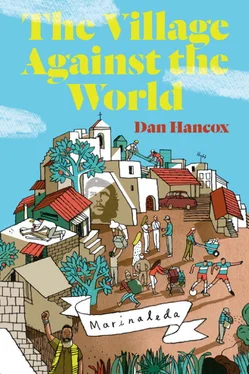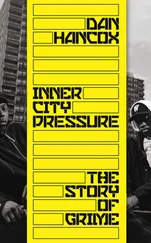Dan Hancox
THE VILLAGE AGAINST THE WORLD
To Javi. Seriously, let me get the next round .
No one can stop us. There is not enough blood, nor enough walls, to prevent that one day, land, rights, and, of course, liberty will be achieved by everyone.
Marinaleda: Andaluces, levantaos , Juan Manuel Sánchez Gordillo, 1980

1
Meet the Village
For as long as human beings have dreamed, they have dreamed of creating a better world. The year 2016 will mark the 500 thanniversary of Thomas More’s Utopia , his short book describing the fictional island of Utopia, a regimented but model community, whose name in Greek means ‘no place’. In the contemporary imagination, utopia has usually meant exactly this – no place real at any rate; nowhere actually existing. A utopia is a projection of our disappointment with the real world around us, a photo-negative of its manifold injustices, and our weaknesses as a species. We are always disappointed, so we dream of better.
We are used to the idea of utopia as an imagined place. It’s often a community located in an alternative, fictional reality; on earth, or in another universe. A made-up world, where the plot twist is often that although this place seems like paradise, it is really built on lies and horror. The stories we tell ourselves are full of cautionary tales that not only is building paradise an impossibility – even attempting to build it is dangerous and hubristic. Aim high, and you will fall further.
If it’s not a projection into a made-up world, utopia is an idealised vision of the future, a manifestation of a political or religious project, a blueprint for how we should all live our lives – and one day, if you would only join the party, or the church, perhaps we all will. These, like the literary utopias, are usually abstract intellectual exercises, rather than concrete attempts to forge a new community. But what if you actually tried to build utopia? How do you go from a fevered dream, an aspirational blueprint, to concrete reality?
In 2004, I was leafing through a travel guide to Andalusia while on holiday in Seville, and read a fleeting reference to a small, remote village called Marinaleda – a unique place, ‘a communist utopia’ of revolutionary farm labourers, it said. I was immediately fascinated, but I could find almost no details to feed my fascination. There was so little information about the village available beyond that short summary, either in the guidebook, on the internet, or on the lips of strangers I met in Seville. ‘Ah yes, the strange little communist village, the utopia’, a few of them said. But none of them had visited, or knew anyone who had – and no one could tell me whether it really was a utopia. The best anyone could do was to add the information that it had a charismatic, eccentric mayor, with a prophet’s beard and an almost demagogic presence, called Juan Manuel Sánchez Gordillo.
Eventually I found out more. The first part of Marinaleda’s miracle is that when their struggle to create utopia began, in the late 1970s, it was from a position of abject poverty. The village was suffering over 60 per cent unemployment; it was a farming community with no land, its people frequently forced to go without food for days at a time, in a period of Spanish history mired in uncertainty after the death of the fascist dictator General Franco. The second part of Marinaleda’s miracle is that over three extraordinary decades, they won. Some distance along that remarkable journey of struggle and sacrifice, in 1985, Sánchez Gordillo told the newspaper El País :
We have learned that it is not enough to define utopia, nor is it enough to fight against the reactionary forces. One must build it here and now, brick by brick, patiently but steadily, until we can make the old dreams a reality: that there will be bread for all, freedom among citizens, and culture; and to be able to read with respect the word ‘peace’. We sincerely believe that there is no future that is not built in the present.
As befits a rebel icon, Sánchez Gordillo is fond of quoting Che Guevara; specifically Che’s maxim that ‘only those who dream will someday see their dreams converted to reality’. As I was to discover, in one small village in southern Spain, this isn’t just a t-shirt slogan.
The heart of Andalusia is a wild place. For many years, the centre of this great region was ‘the cradle of banditry’, where the infamous bandoleros roamed. They were the celebrities of their day, the people’s heroes who robbed from the rich and gave, occasionally, to the poor. Centred around the Sierra Sur mountains, it is an area historically populated by vast tracts of farmland, impoverished landless labourers and popular outlaws – and arrayed against them, the aristocratic landlords, the bourgeois political class, and the hired goons of the powerful: the detested military police force, the Guardia Civil. Spain, wrote Albert Camus, is ‘the native land of the rebel, where the greatest masterpieces are cries uttered towards the impossible’, and those cries resound loudest of all in Andalusia.
Andalusia is the second largest of Spain’s seventeen autonomous communities, and a region which is much more than a region – it’s a sin of omission to call it ‘the southern bit of Spain’. Andalusia has a unique culture and politics, and, more than anything, a unique personality. Its history is marked by a succession of class wars and civil wars, invasions, conquests, uprisings, mutinies and riots, where in spite of these sporadic, often violent disruptions, the quiet but unadorned rhythms of peasant life have remained largely unchanged for millennia. The latest disturbance brought down upon the heads of the Andalusian people is, like the Inquisition, the Reconquista and the Spanish Civil War before it, one they had no responsibility for.
In spring 2013 unemployment in Andalusia is a staggering 36 per cent; for those aged sixteen to twenty-four, the figure is above 55 per cent – figures worse even than the egregious national average. The construction industry boom of the 2000s saw the coast cluttered with cranes and encouraged a generation to skip the end of school and take the €40,000-a-year jobs on offer on the building sites. That work is gone, and nothing is going to replace it. With the European Central Bank looming ominously over his shoulder, Prime Minister Mariano Rajoy has introduced labour reforms to make it much easier for businesses to sack their employees, quickly and with less compensation, and these new laws are now cutting swathes through the Spanish workforce in private and public sectors alike.
Spain experienced a massive housing boom from 1996 to 2008. The price of property per square metre tripled in those twelve years: its scale is now tragically reflected in its crisis. Nationally, up to 400,000 families have been evicted since 2008. Again, it is especially acute in the south: forty families a day in Andalusia have been turfed out of their homes by the banks. To make matters worse, under Spanish housing law, when you’re evicted by your mortgage lender, that isn’t the end of it: you have to keep paying the mortgage. In final acts of helplessness, suicides by homeowners on the brink of foreclosure have become horrifyingly common – on more than one occasion, while the bailiffs have been coming up the stairs, evictees have hurled themselves out of upstairs windows.
Читать дальше














